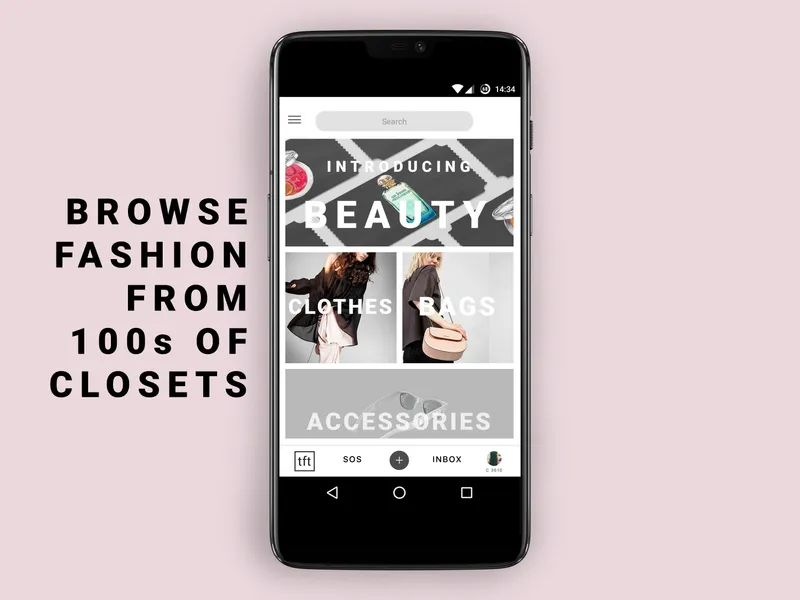Bored of your wardrobe? This Gurugram-based startup lets you swap clothes and accessories with others
This For That, launched in 2018, is a P2P platform for women to swap not just clothes, but unused makeup and toiletries with others. There are plans to include categories for children’s and men’s products soon.
It is the age-old conundrum: a closet full of clothes and still nothing to wear. For women who have either outgrown some items in their wardrobe or are just tired of the old and need a splash of the new, Gurugram-based startup This For That (TFT) has a simple and affordable solution: swap ‘em!
Launched in September 2018, the mobile application platform allows users to swap clothes, shoes, accessories and even makeup and toiletries. At present, the platform is for women only, as founder Nancy Bhasin believes “barter requires deal striking, something which women are naturally good at.” She also believes that once the platform is opened up to everyone, it would be harder to keep a quality check, something the company is very particular about.
The main focus for the platform, even as it explores opening it up to men and children, would continue to remain fashion and women in the age bracket of 18-35 years, says the 32-year-old entrepreneur, who was an advertising professional before launching her startup. Her husband, Vaybhav Singh (42), also a former adman, quit his 16-year career to join her at TFT in January.
How it works

Products acquired on the This For That platform can again be put back on it for others to use, thus creating a cycle of sustainable consumption.
Also read: AI for fashion: BigThinx’s Lyflike app helps you shop better using 3D avatars
Once a user signs up, community managers take her through how the platform functions. For every item put up for exchange, the uploader assigns a value to it in the form of credits (1 credit = Re 1), which is then assessed by TFT’s curation team for fair value and quality. In the scenario that a user wants to acquire something on the platform but does not want to exchange it for anything, she can buy credits and get the product. Those credits would then get transferred to the uploader’s account.
For buying credits on the platform, a user pays only 10 percent of the cost. For example, to buy 1,000 credits, one pays Rs 100. Every user is given 1,000 credits as a joining bonus, which needs to be maintained as a minimum balance.
In case an exchange is taking place where both items have the same value in credits, the users would pay only for shipping. However, if they have credits in their account to cover the shipping, then they pay nothing at all. The shipping cost ranges from Rs 90 for accessories, makeup, etc, to Rs 300 for items like travel bags, clothes, and even lehengas.
Have a fashion emergency and in need of a saree for your farewell party? Users can post on TFT’s nifty SOS feed to get a quick response.
Nancy notes that members are instructed on detailing the damage, if any, and age of the product while uploading pictures and information.
'SUSTAINABLE AF'
Users have the option to either temporarily or permanently swap things. Products acquired from the platform can again be put back on it for others to use, thus creating a cycle of sustainable consumption.
TFT also ties up with brands to help them dispose of their ‘dead stock’ that would usually end up being downcycled and being sold by the kilo, yielding little or no value for brands. The company picks up this stock with a special label attached - ‘SUSTAINABLE AF’. This holds badge value for the environmentally conscious consumer.
The stock is available to members for a credit swap on the app. In return, the company creates content for the brands by roping in social media influencers who sport the collection.
“Swappers look forward to these unique collaborations to get coveted pieces from these brands at a 90 percent discount. Some of the brands TFT has collaborated with are indie design label SUI by Sue Mue (sustainable high-end clothing), and Nakhrewaali (an accessories brand worn by celebrities),” says Nancy.
TFT is currently in talks to partner with a prominent global fast-fashion brand for this initiative.
The platform also offers rewards to members in the form of credits, which if not used, expire in a week. Credits and titles are also given out for the best wardrobe, for being the most active swapper, and the like. Nancy says, “Anyone who has done more than two swaps has been with us and has kept coming back. It’s addictive.”
Also read: Sustainable yet stylish, Rossbelle puts a ‘green’ spin on fashion
Keeping it real
TFT has a strict policy against fake brands and bars its users from uploading copies of brands. Nancy elaborates: “As long as it is an original product, even if it was picked from a flea market, it is welcome on the platform. But no ‘first copies’, this is not a place for fakes.”
High-street fashion labels like Zara and H&M along with indie brands are the most traded brands on the platform.
For high-end designer labels such as Louis Vuitton, members need to furnish extra information during the upload. These include sharing the unique serial number of the product, information on whether the original bill is available along with the original packing etc. TFT takes 24 hours to approve such high-end uploads.
Also read: More women can afford luxury fashion now, thanks to these startups
The idea behind TFT

Vaybhav Singh and Nancy Bhasin, Co-founders, This For That
Nancy had always been gifted clothes and accessories, some of which did not particularly adhere to her sense of style, and they often languished in a corner of her closet. But in most Indian households, as in hers, there was a culture of wardrobe sharing among the women in a family; whether it was a saree, lipstick, or a pair of heels. But she realised that there is a taboo in India associated with wearing or using strangers’ clothes and accessories. She then took it on as a challenge to build a community platform where people could get to know each other, chat and discuss things and refresh their wardrobes without spending big bucks.
On the app, clothes make up the biggest category, followed by beauty, accessories, and shoes. Interestingly, beauty, the second most uploaded category on the app, was initially not part of the platform. “Women were uploading it under accessories and tagging it as ‘others’. Surprisingly, things like eyeshadow palettes and other makeup items have the fastest rate of consumption on the app,” Nancy adds.
The This For That app is available for download on both Google’s Android Play Store and Apple’s iOS App Store. At present, the platform has 10,000 members, with nearly 5,000 active users exchanging around 7,000 messages though the in-app messenger every day. The members are spread across the country, and are not just restricted to the big cities; they hail from smaller towns as well.
The startup has plans to expand the platform to include men’s and children’s goods in the next 6-8 months. In fact, some swapping in these categories is already happening on the platform. “For instance, there are women who put up their husband’s or boyfriend’s unused aftershave lotion, saying they have a beard now and it’s of no use anymore,” Nancy laughs.
As far as children’s products are concerned, the platform has been getting a significant amount of requests to have them included. “Kids clothes get small, books get redundant; they outgrow toys, baby car seats, there is a lot of opportunity in the space,” she says, adding, "Once the platform is opened up for men, TFT would want to keep the transacting restricted to women, at least in the initial days."
Also read: Affordability trumps taboo as pre-owned fashion finds a market
Standing apart as a community platform
On competition, Nancy points out while there are other places for second-hand buying and selling, no one has a community platform like TFT.
In the fashion space, there are players such as Elanic, and Coutloot. In fact, Coutloot has a similar range of product offering, which includes accessories, beauty etc. along with fashion.
However, Nancy says: “These are pure transactional platforms. Most of them have deserted the peer-to-peer format. They are only controlling the inventory and are just buying and selling platforms. They are not a community.”
In the rental space in India, there are players such as Flyrobe, and Stage3.
TFT makes money through members buying credits, and has a “decent margin” on shipping. The company has a delivery partner on board and claims that no one else is doing peer-to-peer deliveries across the country other than TFT. In the hyperlocal peer-to-peer delivery space, though, there are companies such as Dunzo.
The company has raised a friends-and-family round and is currently in discussions with some prominent venture capital firms in India to raise more money.
The Gurugram-based startup says it has been making money through credits, right from the first transaction.
And there is much room to grow, given India’s burgeoning ecommerce and the country’s digitisation push. Nancy says, “India is at this very interesting crossroads where fashion consumption with ecommerce has skyrocketed and the consumption appetite has increased voraciously. From the late 2000s the Flipkarts and Amazons of the world have provided access from a distribution and brand point of view. They have blown people’s minds with massive discounts on products and have got people hooked. Our platform offers an alternative consumption model; one that will keep filling into this appetite, while giving them a value proposition. This would make them want to keep coming back.”







